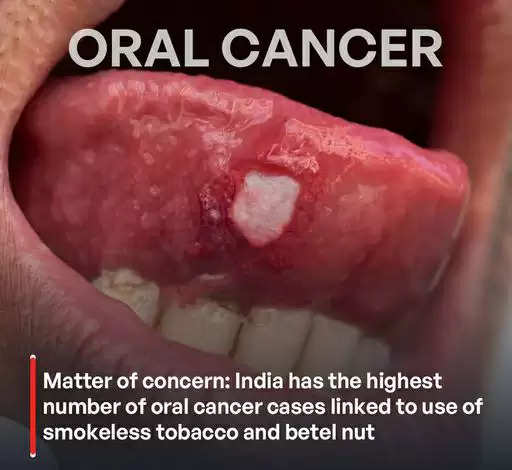India Leads Global Oral Cancer Cases Linked to Smokeless Tobacco and Areca Nut Use

With 83,400 out of 120,200 worldwide cases recorded in 2022, a new study published in The Lancet shows India has the largest number of oral cancer patients in South Asia associated to the use of smokeless tobacco and areca nut. This concerning figure emphasises the major contribution of smokeless tobacco to the worldwide oral cancer load as well as the developing public health issue in the area.
Growing Threat: Smokeless Tobacco and Areca Nut
With India leading the way, the study, which concentrated on the frequency of oral cancer linked with smokeless tobacco and areca nut usage, revealed South-Central Asia bearing the biggest burden. The study revealed that India alone accounted for more than 69% of the worldwide cases, a clear sign of the extensive use of these drugs in the nation.
Apart from India, several nations in the region have recorded significant rates of mouth cancer linked to usage of smokeless tobacco and areca nut. Bangladesh came in with 9,700 instances; Pakistan came in with 8,900; and Sri Lanka came in with 1,300. Especially in other parts of South-East and East Asia, high incidence rates were also noted, therefore aggravating the public health issues related to these drugs.
The Part Areca Nut and Smokesless Tobacco Play in Oral Cancer
Highly common in the area are smokeless tobacco products including gutka, khaini, betel quid, mixed with areca nut. These chemicals are connected to a notable rise in mouth cancer risk. The study indicates that approximately thirty percent of all instances of mouth cancer worldwide are related to smokeless tobacco. Men and women in India especially love these products because of their inexpensive cost, easy accessibility, and strong marketing campaigns.

The investigation exposed alarming numbers of usage of these products in India. Of the ladies who ate areca nuts, almost thirty percent used betel quid with tobacco. More concerning, twenty-one percent of women used khaini and gutka. Men had even more of a prevalence of smokeless tobacco use: 47% of oral cancer cases in men were connected to khaini, 43% to gutka, 33% to betel quid with tobacco, and 32% to areca nut.
Because these drugs are so widely used, India has an excessive oral cancer prevalence. This information demands quick response to handle the public health issue caused by intake of smokeless tobacco and areca nut.
Health Conventions and the Demand for Control
Prominent Head and Neck Cancer Surgeon Dr. Pankaj Chaturvedi of the Tata Memorial Centre has been outspoken about the effect of smokeless tobacco and areca nut on mouth cancer rates in India. He underlined that the great occurrence of oral cancer might be mostly attributed to the aggressive marketing and simple availability of certain items. He underlined that even if these products barely bring in money for the government, their health effects and related medical expenses are significant.
Though he pointed out that the tobacco business has discovered means to get around these bans, Dr. Chaturvedi also highlighted the gutka ban as a "courageous move." Popular chewable tobacco product Gutka was outlawed by the Indian government in 2012, but the business has since adjusted and keeps creating and selling such goods under other names. This legal gap in control has made it challenging to stop the spread of oral cancer cases connected to smokeless tobacco.
Stronger laws and public awareness initiatives are, according to experts, absolutely necessary to address the problem of smokeless tobacco and isca nut usage. Important actions that must be done are tightening sales and marketing limitations on these items, raising public awareness of mouth cancer dangers, and opening access to smoking cessation programs.
To lower the worldwide load of oral cancer, Dr. Chaturvedi further underlined the need of more government action and international cooperation. He cautioned, "the impact on public health is severe; without quick and coordinated action, these numbers will only continue to rise."
Experts and legislators both will have to cooperate to reduce the general use of these dangerous drugs and safeguard public health in India as it struggles with the twin issues of a growing mouth cancer rate and the predominance of smokeless tobacco products.
--
